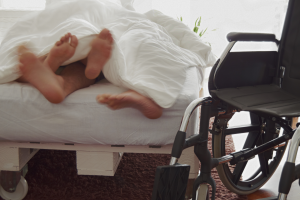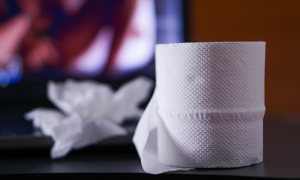
STIs Are Not Just for the Young
STIs aren’t about age, they’re about sexual behavior. Older people are having sex, and they need to be thinking about sexually transmitted infections.

By Evelyn Resh, CNM, MPH, CSC, MSN
The number one complaint of women that I see for sexuality counseling is that they have no libido – zip, gone, disappeared. They tell me they’d rather do just about anything else than have sex; bake 100 cupcakes at midnight, shovel snow, or do laundry.
Contrary to what many of us assume, this happens to women of all ages and levels of love, attachment, and attraction to their partners. This is not just a problem for members of the post-menopausal set who feel as though their mojo went out the window and their hot flashes took its place. But, this is not always an actual absence of libido. A woman’s lack of being turned on physically is not necessarily reflective of a lack of desire for sex but a misunderstanding of how she gets turned on in the first place. In a world of rampant sexual illiteracy, with no owner’s manual to refer to, how could any woman be expected to know this?
Unlike men, our brains have a smaller area that controls sex drive and action. They’re also shaped by estrogen, not testosterone. These two differences demand that we finesse and lure our physical sensations of desire out of hiding every time we look for them.
Women often initiate sex from a longing for intimacy, rather than actual physical desire. Men, on the other hand, are slaves to the beat of the figurative sexual Tom-Tom and have the neuroanatomy and chemistry to let their erections steer the ship. Few women are aware of–never mind sympathetic to- this, and falsely label men’s sex drive as a primitive, uncontrolled, and offensive objectification of them – au contraire, men are the lucky ones.
Meanwhile, women are beside themselves because they have no propulsive force at all, when what’s actually happening is that women give up before they’ve even gotten started. In the absence of a physical sensation of arousal beyond a minute or so, women throw in the towel and head towards the laundry, lunches, or emails instead of hanging in there and coaxing their arousal to surface. Yet again, we mistake our lack of sensation for an overall lack of interest.
Many women need 5-20 minutes of warm-up time before they start to feel the unmistakable sensation of being turned on. And it is possible that these sensations may never occur. Having been in this position myself, I have stayed in the moment just to see what happens. It’s not so bad. Having sex when your head says: “give it a go” but your body says: ”what, are you kidding, now?” is kind of like exercising when you’d rather be watching television.
Most people who are conscious about their health go out and hike and end up being glad they did, even if the hike they took wasn’t their best. I have decided sex isn’t so different. So what if your sexual experience was a C-? There are no sex police who will arrest you, nor will you be fired from your relationship. Welcome to the Likert scale of human sexual experience. On a scale of 1-5, you either strongly agree that your sex was great or strongly disagree. You win some, you lose some. The stakes don’t need to be so high, and the only people who have control over this are the people who have sex with one another.
Take the pressure off yourself and your partner. Sexual experiences fall on a continuum–some are hotter than others. It’s really that simple.
 Evelyn Resh is a certified sexuality counselor and a certified nurse-midwife with over 20 years of experience as an integrative health and sexuality practitioner. She has also written for many websites including Oprah.com and The Huffington Post. Her books include Women, Sex, Power, and Pleasure: Getting the life (and Sex) You Want and The Secret Lives of Teen Girls: What Your Mother Wouldn’t Talk About but Your Daughter Needs to Know.
Evelyn Resh is a certified sexuality counselor and a certified nurse-midwife with over 20 years of experience as an integrative health and sexuality practitioner. She has also written for many websites including Oprah.com and The Huffington Post. Her books include Women, Sex, Power, and Pleasure: Getting the life (and Sex) You Want and The Secret Lives of Teen Girls: What Your Mother Wouldn’t Talk About but Your Daughter Needs to Know.

STIs aren’t about age, they’re about sexual behavior. Older people are having sex, and they need to be thinking about sexually transmitted infections.

In this essay, certified sexuality counselor Evelyn Resh reflects on how our sex lives and perceptions of pleasure change over time.

Featuring interviews with medical professionals and experts in the field of sexuality, ASHA’s Sex+Health podcast aims to offer information and resources to with the goal of helping people take charge of their sexual health.

March is Sexual Pleasure MonthCelebrate it with Us! Sex is good for you! Our bodies thrive on the chemicals released during orgasm, so a healthy sex life is part of

A new paper suggests that there are biological and evolutionary reasons that we masturbate and looks to our ape ancestors for evidence. There is evidence starting around 40 million years ago that the ancestors of all monkeys and apes did indeed masturbate.

Whether we’re attracted to the opposite gender, the same gender or both, the truth is: We learn how to experience sexual pleasure for pleasure’s sake by understanding our own sexual desires and responses.
ASHA believes that all people have the right to the information and services that will help them to have optimum sexual health. We envision a time when stigma is no longer associated with sexual health and our nation is united in its belief that sexuality is a normal, healthy, and positive aspect of human life.
ABOUT
GET INVOLVED
ASHA WEBSITES
GET HELP
© 2025 American Sexual Health Association